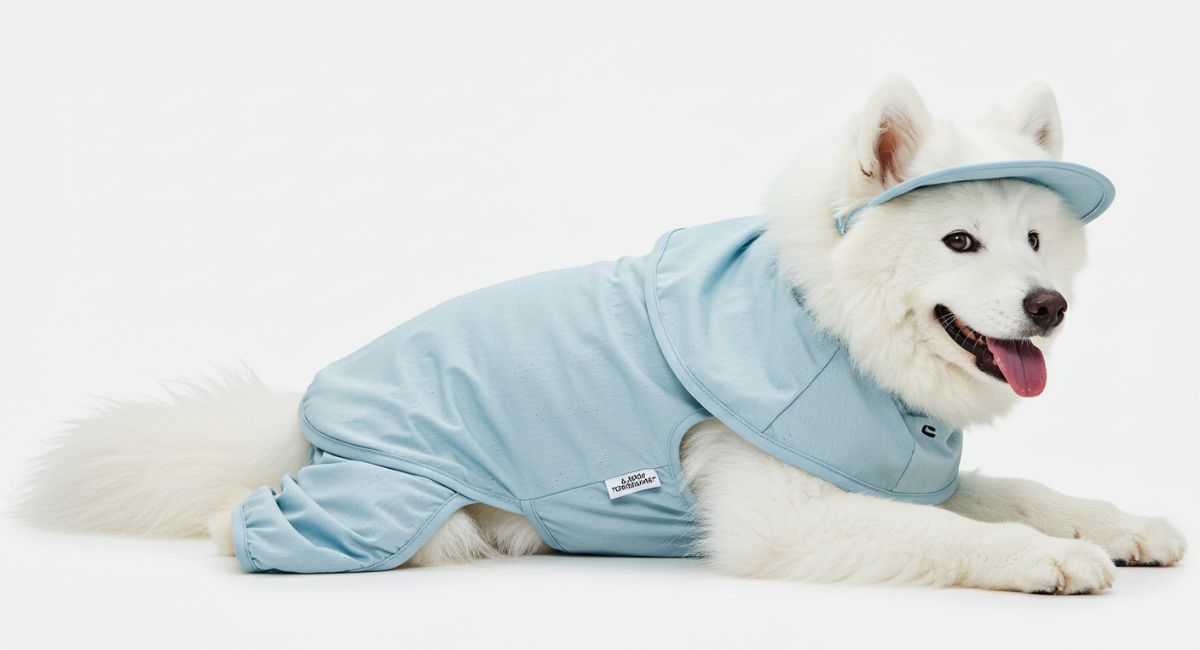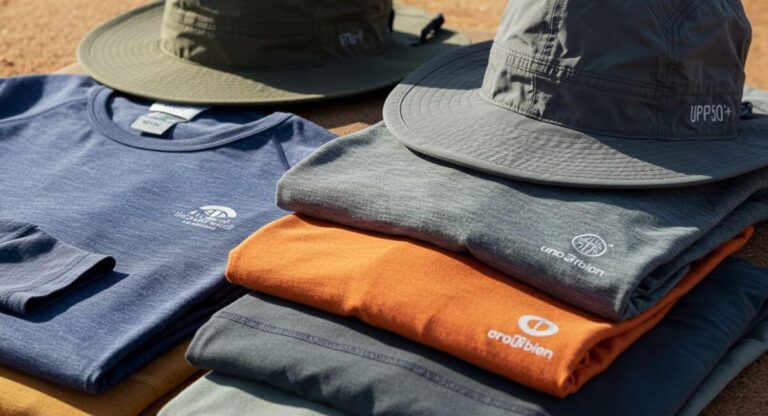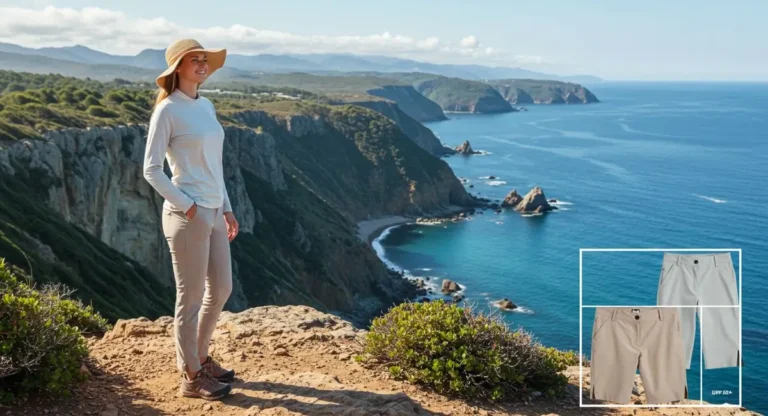Best Dog Sun Protection Clothing to Keep Your Pup Cool & Safe
Why I Started Taking Sun Protection for My Dog Seriously
Last summer, I noticed something concerning about my golden retriever, Buddy. After our longer walks during those scorching July afternoons, the skin on his nose looked pinker than usual, and he seemed uncomfortable. When I mentioned this to our vet during a routine checkup, her response surprised me: “Your dog has a sunburn.”
I felt terrible. I’d been diligent about applying sunscreen to my own skin but had completely overlooked my furry best friend’s needs. That day changed everything about how I approach outdoor time with my dog.
Dogs, like humans, can suffer from sunburn, heat exhaustion, and even skin cancer. Their fur provides some protection, but many areas—like the nose, ears, and belly—remain vulnerable, especially for short-haired, light-colored, or thin-coated breeds.
Today, I’m sharing everything I’ve learned about dog sun protection clothing. Whether you have an active outdoor companion or a pup who just enjoys lounging in the yard, this guide will help you keep them safe from harmful UV rays while staying comfortable in the heat.
Understanding Your Dog’s Sun Exposure Risks
Before diving into protection options, it’s important to understand which dogs are most at risk:
High-Risk Dogs
- Light-colored or white dogs have less pigmentation in their skin
- Short-haired or hairless breeds like Xoloitzcuintli, Chinese Crested, or Greyhounds
- Dogs with thin coats or naturally sparse fur coverage
- Dogs with pink noses or light-colored skin
- Dogs who have had areas shaved (perhaps for surgery or grooming)
Medium-Risk Dogs
- Dogs with light-colored bellies (many breeds have lighter fur on their undersides)
- Dogs who love to sunbathe on their backs
- Active outdoor dogs who spend significant time in direct sunlight
Even dark-furred dogs can get sunburned on exposed areas like their bellies and noses!
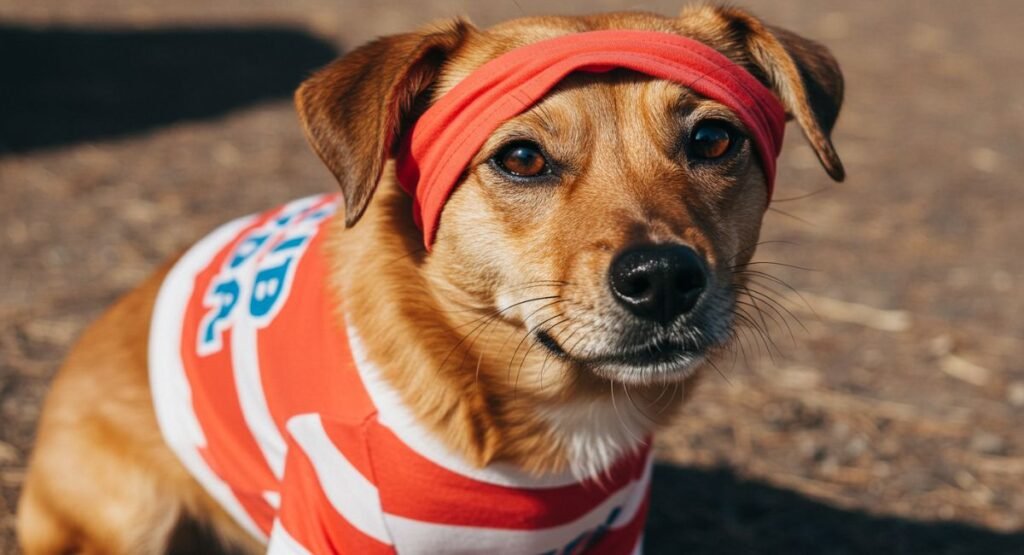
Signs Your Dog Might Be Experiencing Sun Damage
How can you tell if your dog has had too much sun? Look for these symptoms:
- Redness on exposed skin areas
- Dry, cracked skin or nose
- Excessive scratching or licking at certain areas
- Hair loss in sun-exposed areas
- Curling at the edges of the ears (in extreme cases)
- Obvious discomfort when touched in sun-exposed areas
If you notice any of these signs, consult your veterinarian immediately.
Essential Dog Sun Protection Clothing Options
Full-Body Sun Suits
These provide the most comprehensive protection for dogs who spend significant time outdoors.
My Top Pick: PlayaPup UV Protection Full Body Dog Suit
What I love about it: This full-body suit covers most of your dog’s skin while allowing for easy movement. The lightweight, breathable fabric offers UPF 50+ protection, blocking 98% of harmful UV rays.
Key features:
- UPF 50+ protection
- Four-way stretch fabric for comfort and mobility
- Easy bathroom breaks with strategic openings
- Machine washable
- Available in sizes XXS to XL
- Multiple color options
Perfect for: Hairless breeds, dogs with short white coats, and any dog spending extended time outdoors.
Available on Amazon: PlayaPup UV Protection Full Body Dog Suit
Runner-up: K9 Top Coat Sun Shield Bodysuit
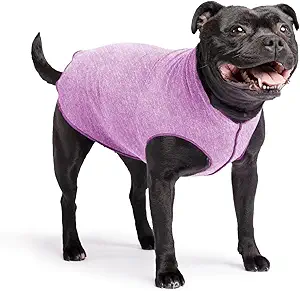
This full-coverage option is excellent for dogs who need maximum protection with minimum weight.
Available on Amazon: K9 Top Coat Sun Shield Bodysuit
Dog Sun Shirts & T-Shirts
For dogs who need protection but might find full suits too restrictive, sun shirts are an excellent option.
Best Value: SUITICAL Recovery Shirt with UV Protection
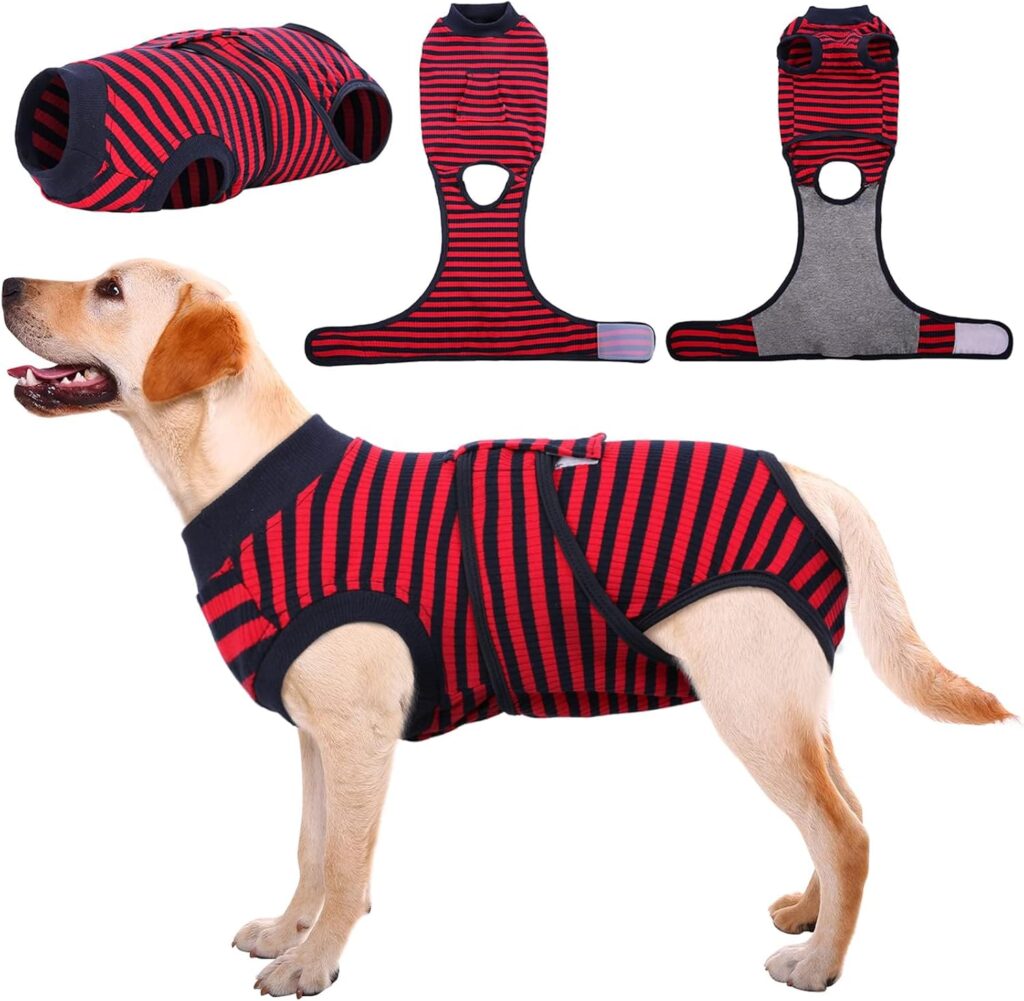
What I love about it: Originally designed as a recovery alternative to the “cone of shame,” this shirt provides excellent sun protection while being extremely comfortable for dogs.
Key features:
- Soft, breathable fabric with UV protection
- Four-way stretch for freedom of movement
- Machine washable
- Covers trunk and upper limbs
- Works well for both male and female dogs
Perfect for: Dogs who need protection for their backs and chest areas but prefer more freedom than a full suit.
Available on Amazon: SUITICAL Recovery Shirt with UV Protection
Dog Sun Visors & Hats
Protecting your dog’s face, especially the nose and ears, is crucial as these areas are highly susceptible to sun damage.
Most Practical: RC Pet Products Dog Visor
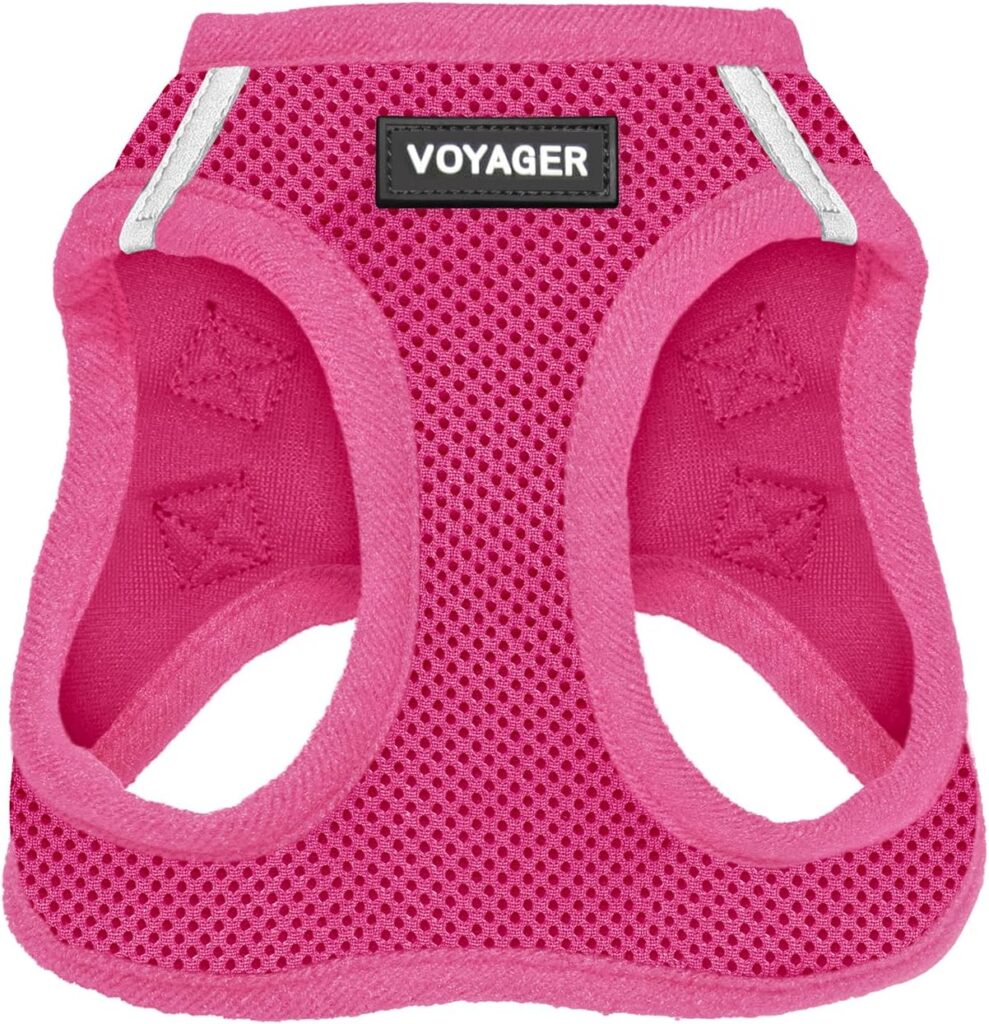
What I love about it: This lightweight visor stays in place better than most dog hats I’ve tried, and it provides targeted protection for the face without overheating your dog.
Key features:
- Adjustable chin and neck straps
- Wide brim for face and ear protection
- Lightweight material
- Water-resistant
- Available in multiple sizes
Perfect for: Dogs who need face protection but won’t tolerate full hats.
Available on Amazon: RC Pet Products Dog Visor
Dog Cooling Vests
These serve the dual purpose of sun protection and temperature management.
Best Overall: Ruffwear Swamp Cooler Cooling Vest
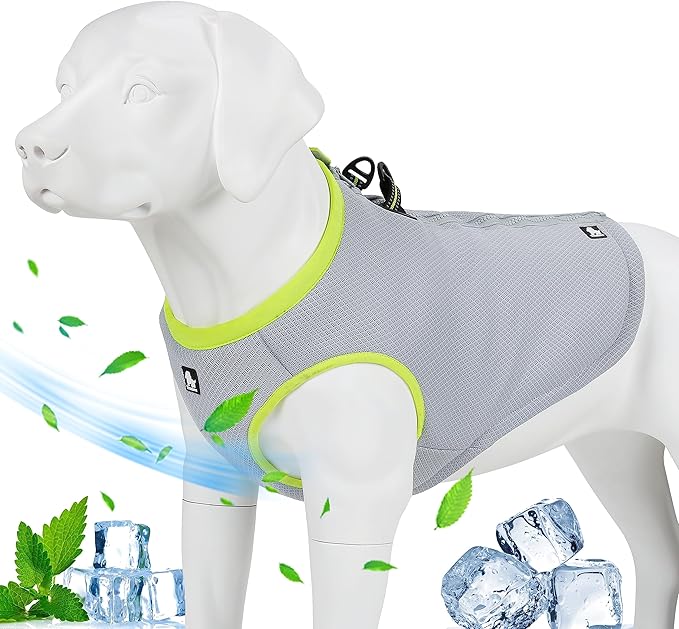
What I love about it: The three-layer construction actually works to keep dogs cool through evaporation, while the light color and coverage protect against UV rays.
Key features:
- Reflects heat and provides UPF 50+ protection
- Cooling effect through evaporation
- Side release buckles for easy on/off
- Leash portal compatible with most harnesses
- Available in sizes XXS to XL
Perfect for: Active dogs who need both sun protection and cooling during hot weather activities.
Available on Amazon: Ruffwear Swamp Cooler
Budget-Friendly Option: SGODA Cooling Dog Vest
This affordable option provides similar benefits at a lower price point.
Available on Amazon: SGODA Cooling Dog Vest
Protective Boots for Hot Surfaces
While not strictly sun protection, boots protect paws from hot surfaces, which is an important aspect of summer safety.
Most Reliable: RUFFWEAR Grip Trex Dog Boots
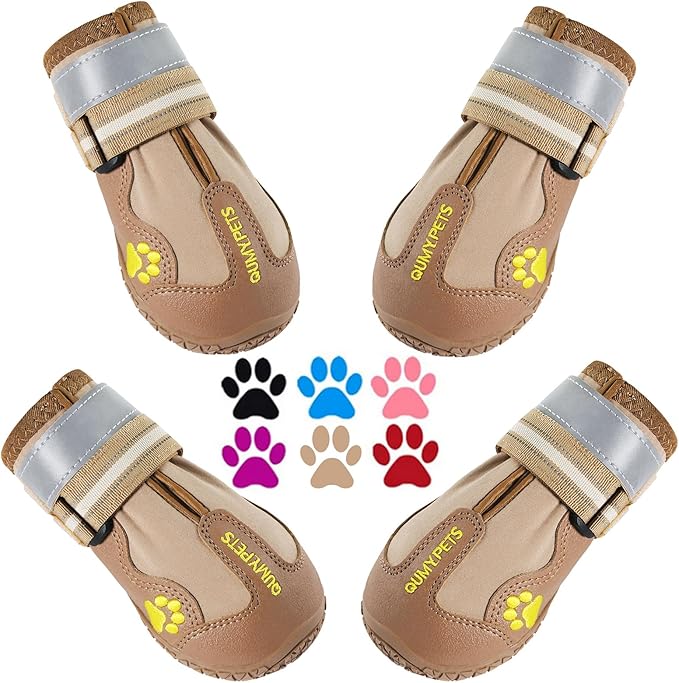
What I love about it: These boots actually stay on during activity, which is rare in dog footwear. The rugged design protects paws from hot pavement and rough terrain.
Key features:
- Vibram non-marking outsole provides excellent traction
- Breathable mesh upper for ventilation
- Secure ankle closure
- Sold in sets of four
- Available in 8 sizes
Perfect for: Dogs walking on hot pavement, sand, or rough trails.
Available on Amazon: RUFFWEAR Grip Trex Dog Boots
How to Choose the Right Sun Protection for Your Dog
Selecting the right sun protection depends on several factors:
1. Your Dog’s Coat Type
| Coat Type | Recommended Protection |
|---|---|
| Hairless | Full body suit + hat/visor |
| Short & light-colored | Full body suit or shirt + hat |
| Short & dark | Shirt for belly protection |
| Medium to long | Strategic protection for exposed areas (belly, nose) |
2. Activity Level
| Activity | Recommended Protection |
|---|---|
| Beach/Swimming | Quick-dry sun shirt, cooling vest |
| Hiking | Cooling vest, paw protection |
| Park visits | Lightweight sun shirt |
| Yard lounging | Sun visor, belly protection |
3. Climate Considerations
| Weather Condition | Special Considerations |
|---|---|
| Hot & humid | Prioritize cooling + protection |
| Hot & dry | Focus on hydration + full coverage |
| High altitude | Extra attention to nose/ear protection |
| Reflective environments (beach, snow) | Maximum UV protection |
How to Introduce Dog Sun Protection Clothing to Your Dog
From my experience, not all dogs immediately accept wearing clothing. Here’s my step-by-step approach:
- Start with short sessions – Begin with just 5-10 minutes of wear time
- Use positive reinforcement – Treats and praise make the experience positive
- Associate with fun activities – Put the clothing on right before something enjoyable
- Check for proper fit – Ensure there’s no rubbing or restriction of movement
- Gradually increase wear time – Add a few minutes each session until your dog is comfortable
“The most important factor in getting your dog to accept protective clothing is patience and positive association. Never force them or punish resistance.”

Beyond Clothing: Complete Sun Protection Strategy
Sun protective clothing works best as part of a comprehensive approach:
Create Shade Opportunities
- Portable dog canopies are great for beach trips
- UV-protective pet tents provide cool resting places
- Attach an umbrella to your dog’s crate for outdoor events
Time Your Outings Strategically
I’ve adjusted my schedule to avoid the most intense sun hours (10 AM – 4 PM) whenever possible. Early morning or evening walks are much safer during summer months.
Doggy Sunscreen
For areas that can’t be covered with clothing (like the nose tip), dog-specific sunscreen is essential.
Important: Never use human sunscreen on dogs unless approved by your veterinarian. Ingredients like zinc oxide and para-aminobenzoic acid (PABA) are toxic if ingested by dogs during grooming.
My veterinarian recommends:
- Epi-Pet Sun Protector Spray (FDA compliant for dogs)
- Warren London Dog Sunscreen (Non-toxic, non-greasy formula)
Both are available on Amazon and at specialty pet retailers.
My Personal Experience: What Worked and What Didn’t
After trying numerous products, I’ve learned some valuable lessons:
What Worked Well:
- Cooling vests for active dogs who resist full coverage clothing
- Lightweight shirts with UV protection for everyday walks
- Visors rather than full hats (much better acceptance)
- Introducing clothing gradually with lots of treats and praise
What Didn’t Work:
- One-piece full suits for dogs who need frequent bathroom breaks
- Dark-colored dog sun protection clothing (defeats the purpose by absorbing heat)
- Tight-fitting items that restrict movement or cause chafing
- Expecting immediate acceptance without training
Key Takeaways
- All dogs need sun protection, especially light-colored, short-haired, or hairless breeds
- Start with essential areas like the nose, ears, and belly if your dog is resistant to clothing
- Choose appropriate protection level based on your dog’s coat type and activities
- Look for UPF 50+ ratings on dog sun protection clothing
- Combine clothing with timing strategies (avoiding midday sun) and shade options
- Use dog-specific sunscreen for areas that can’t be covered with clothing
- Introduce sun protection gradually with positive reinforcement
Frequently Asked Questions
Can dogs get skin cancer?
Yes, absolutely. Dogs can develop several types of skin cancer, including squamous cell carcinoma, malignant melanoma, and hemangioma. White and light-colored dogs are at higher risk, especially on their noses, ears, and belly areas that have less fur coverage.
How long can my dog safely be in direct sunlight?
This varies greatly depending on your dog’s coat color, thickness, and individual sensitivity. As a general rule, limit direct sun exposure during peak hours (10 AM – 4 PM), and always provide shade options. For hairless or very short-coated dogs, even 15-30 minutes of direct midday sun can be too much.
Will my dog overheat in sun protection clothing?
Quality dog sun protection clothing is designed to be cooling, not heating. Look for lightweight, breathable fabrics with moisture-wicking properties. Cooling vests are particularly effective as they protect from UV rays while actively cooling your dog through evaporation.
Can I use human sunscreen on my dog?
Generally, no. Many human sunscreens contain ingredients toxic to dogs if ingested, particularly zinc oxide and para-aminobenzoic acid (PABA). Only use sunscreens specifically formulated for dogs, or those your veterinarian has approved.
How do I know if my dog has a sunburn?
Look for redness on exposed skin, particularly on the nose, ears, or belly. The skin may appear dry or cracked, and your dog might show discomfort when these areas are touched. Severe sunburns can cause blistering or peeling skin.
Do dark-furred dogs need sun protection?
Yes, but less extensively than light-colored dogs. Even dark-furred dogs typically have less pigmentation on their bellies and can get sunburned there. Their nose and ear tips can also be vulnerable, especially if they have thin fur.
How often should I replace my dog sun protection clothing for my dog?
Most quality dog sun protection clothing will last 1-2 seasons with regular use before the UV protection begins to diminish. Replace items if you notice:
- Fabric thinning or becoming transparent when stretched
- Significant fading
- Elasticity loss in straps or closures
- Damage to seams or closures
Conclusion
Taking dog sun protection clothing seriously has transformed my outdoor adventures with my dog. Not only do I have peace of mind knowing I’m protecting him from painful sunburns and potential skin cancer, but he’s also more comfortable and can enjoy longer outings during warm weather.
Finding the right sun protection clothing may take some trial and error, but the investment is well worth it for your dog’s health and comfort. Start with understanding your dog’s specific needs based on their coat type and activities, then introduce protection gradually with plenty of positive reinforcement.
Remember that clothing is just one component of a comprehensive sun safety strategy that should include timing considerations, shade options, and possibly dog-safe sunscreen for exposed areas.
Has your dog tried dog sun protection clothing? I’d love to hear about your experiences in the comments below!
Author’s Top Picks
- Is SPF 15 Enough for sun protection? What the Best Dermatologists Say
- Bandaids & Sun Protection: Do Bandaids Protect Scars from the Sun?
- Top Picks for the Best Sun Protection Clothing Women’s This Season
- Best Sun Protective Clothing for Beach Days, Hikes & Everything In Between
- Is Coconut Oil Good for Sun Protection?What You Need to Know

